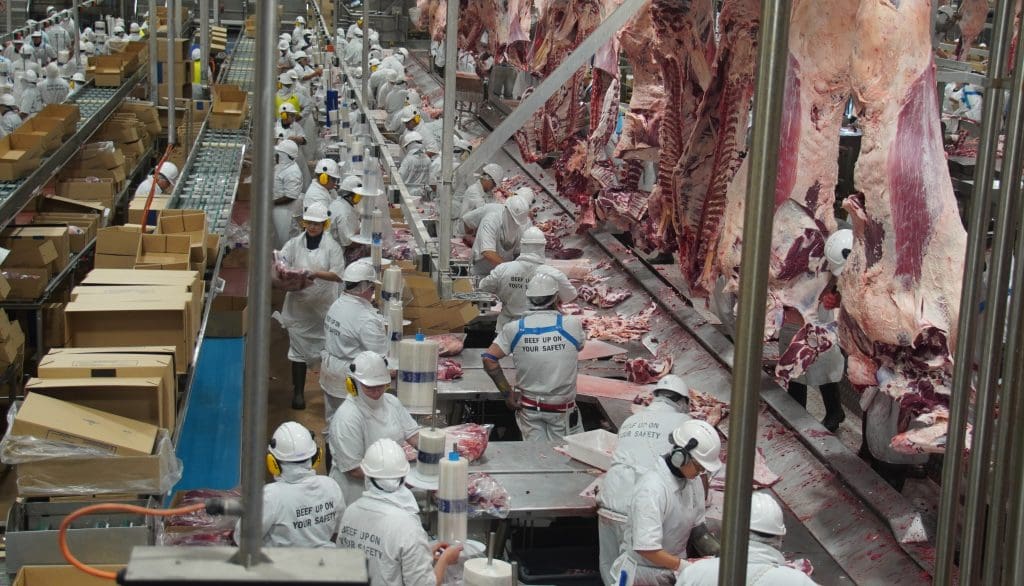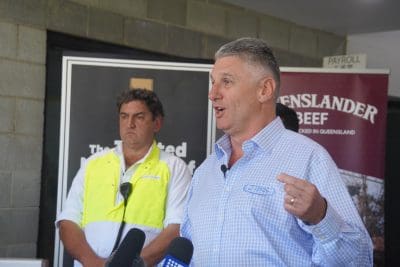
JBS Australia could add up to 1700 head per day to its Dinmore (Qld) processing plant roster next year under plans announced today to introduce a second daily production shift.
If the company achieves its objective, it means Dinmore would operate for around 20 hours a day, five days each week, processing up to ten percent of Australia’s entire beef processing capacity.
At capacity, Dinmore is the largest beef plant in the southern hemisphere when measured by carcase weight, but has not operated its second shift since the previous drought turnoff cycle in 2019, due to labour constraints and limited cattle supply.
The objective is to introduce the second shift during the first quarter next year, with recruitment for the process already underway. If and when fully executed, it could amount to 500 or more new jobs for the local Ipswich region.
There has been industry speculation about adding a second shift at Dinmore for most of this year as cattle supply momentum has grown – but as it has for all meat processors, labour access constraints have been a big stumbling block.
The addition of a second shift, once fully implemented, will take the plant’s total staff complement to more than 1800.
Dinmore produces a wide range of grass and grainfed beef brands that are supplied to major national Australian supermarkets and overseas markets in Asia, North America and the Middle East.
As part of its recruitment drive to encourage locals to apply for the new positions, JBS is offering new flexible work initiatives, and has established a program working with Brisbane and Ipswich High Schools to provide school-based traineeships and a pathway to employment for school-leavers.
Today’s jobs announcement is supported by a recent $77 million investment made by JBS in the Dinmore plant, directed at technology and capital works that support improved safety outcomes as well as increasing capacity and productivity. The projects include a new high-tech trim management system; expanded chiller capacity; and an automated carcase marshalling rail system, declared the first of its kind in the world. More details on this project in a separate story in coming days.

JBS chief executive Brent Eastwood address this morning’s announcement
JBS Australia chief executive Brent Eastwood told this morning’s on-site announcement that the Dinmore asset was very important for the beef processing sector, and for food security reasons.
After sinking to 35-year lows after the 2019 drought, the Australian beef herd was returning to more normalised numbers, he said.
“We believe that creates this opportunity to put this second shift on, and bring Dinmore back up to a ‘new normal,’ which will be somewhere between where we are today (1700 head), and a higher number, that’s not yet defined.”
“We believe overseas beef markets will get back to a more normalised state. The cycles are turning for Australian beef. In the US, we have an opportunity as a country to win back market share, and Dinmore is very well positioned for that,” Mr Eastwood said.
“We believe it’s the right time. We are entering into a challenging environment in Australia with the drought impact and forecast for dry conditions for some time. We have all of our facilities (Dinmore, Rockhampton, Townsville and Beef City in Queensland, plus Scone and Riverina Beef in NSW, Brooklyn in Victoria and Longford Tas) as ready as we can to process the surplus livestock, as they come to market.”
Mr Eastwood told this morning’s gathering that 500 extra jobs was a challenging target, in an environment of low unemployment, and a challenging skills market.
“These 500 will have to come from numerous areas,” he said. “Our first priority, at all times, is to hire locally – especially young people coming out of school, looking for careers.
“But we won’t be able to employ all 500 locally. We will have to supplement that with some foreign workers, and particularly through the PALM Pacific Labour scheme, which has been a good program for JBS right around Australia.”
“But accommodation is a real problem – not just here but everywhere in regional Australia. So where we can employ staff locally, that covers both, and puts more money back into the local community.”
“We are working closely with the local, state and federal governments on training and skills, to help fill the great career opportunities we have available.
“We have many, many people in our business that have started at the bottom of the food processing industry, and are now managing big facilities for JBS. It’s a great career path.”
Local member’s first job
Federal member for the local seat of Blair, Shane Neumann, told the gathering the unemployment rate for the local city of Ipswich was presently 5.2pc, and the youth unemployment rate 13.4pc.
“With the national unemployment rate at just 3.7pc, we have a ready-made pool of people coming out of our schools here who will be able to get access to up to 500 new jobs – and potentially more, with the livestock supply issues hopefully resolved in the New Year.”
Mr Neumann said as a young secondary school student growing up in Ipswich, his first job was as a cleaner at Dinmore.
“Opportunities exist for those kids from local high schools – these are well-paid, secure jobs that provide a career path,” he said.
“Dinmore plant manager Murray Wilson, for example, started on the production floor, and now has a great career managing a very large food production business for JBS.”
Mr Neumann said JBS had been under a lot of pressure during the COVID period, including being undercut by other processing companies getting JobKeeper allowances (JBS did not), at the same time doing labour hire.
“JBS was a good employer over the COVID period, working with the unions to keep as many jobs as possible. But they did lose that second shift, so getting it restored next year is really important for Ipswich, and for JBS.”
“JBS (along with some other processors) has had other challenges with embargoes on Chinese market health certifications, but the company has worked through that with its workforce, and is now looking to a bright future.”
“This is such an opportunity for young people – and indeed older ones – in our community, creating innovative workplace jobs, delivering productivity improvement here in Ipswich,” Mr Newman said.
“Today is about a company coming out of that financial crisis during COVID, and rebuilding. This decision is a great shot in the arm for Ipswich, and a demonstration of JBS’s commitment to the local area.”
Will an expanded Dinmore act as pressure valve?
During an on-site media briefing this morning, CEO Brent Eastwood said with more cattle now coming to market that needed to be processed due to dry conditions, he hoped JBS could accommodate more of those cattle.
“It’s a very cyclical business. Production capacity has been down as a result of labour shortages, so to get back to some degree of normality is good for the cattle producer,” he said.
“Increasing production in this way should make more beef available. I’d imagine it’s good for everybody, including the consumer,” Mr Eastwood said.
Asked whether the additional capacity through Dinmore – albeit with a considerable lag before that really kicks-in – would provide a pressure value for the current imbalance between excessive cattle supply and processors’ ability to handle them, he said, “it certainly can’t hurt.”
“At the end of the day, it is a supply and demand situation. The dry environment we are in today is unfortunately putting a lot of pressure on the condition of cattle. Will we (processors) be able to address that imbalance perfectly? I don’t believe so, but we’ll certainly do our bit to help the situation – as I am sure our competitors are.
“They are all looking to commit whatever processing capacity they can, because of the situation we are going to be in.”
Strong demand outlook
Mr Eastwood said JBS remained confident about demand for protein globally, which is growing every year.
“The cycle Australia is going into is the opposite of what’s happening in the US,” he said. “They are going into a rebuild phase, and US beef production is declining.
“But Australia, as a country, has lost a lot of beef market share to the US exporters over the previous three or four years of very low production, as our own herd recovered from the 2019 drought. There’s an opportunity for us to now get prices up again, in those markets that have been depressed, and which have been challenged due to inflation and currency movement.”
“We encourage anyone in the local Ipswich area and surrounding communities to apply for vacant roles and join the JBS family. A core pillar of our career opportunities is building pathways for our people to take on new responsibilities and progress within the company,” he said.
“Our JBS Dinmore plant is a celebration of diversity and culture, our workforce represents 47 nationalities. Together, our Dinmore team works hard to contribute to Australia’s food security and deliver locally produced Aussie beef to dinner tables around the world,” Mr Eastwood said.
“More to Meat” campaign having impact
Another JBS senior executive attending this morning’s announcement – John Berry – is also the chair of the Australian Meat Processor Corporation.
He said the processing industry, through its “More to Meat” awareness program, had made a significant investment in creating awareness about the career path opportunities for young people in the red meat processing industry.
“We think it is now paying off. AMPC has done some survey work that is going to be presented to industry which shows encouraging trends. But it’s also important to focus on where we can do more in certain regions across the country, because red meat processing is a major employer in regional areas,” Mr Berry said.
“But it’s important for industry to engage in the “More to Meat” program, and co-brand, where possible.”
“There’s a lot of people working in processing who started off in entry-level positions, who are now in management positions across the industry. It’s a great news story.”
- Stand by for an in-depth article on Dinmore’s latest $77 million investment in its brand new trim management system.
- People interested in seeking employment at the expanded Dinmore site can click here to access the JBS website



I am currently looking for such kind of job. If any space available please let me know immediately. My visa subclass 408 work ✅️.
My contract details issue 0459 477 606 Samuel Anea Email address Samueldestroanea@gmail.com
Applicant Samuel Anea.
Great work
With all the extra feedlot capacity in Queensland, and more proposed like the approved 36 000 head feedlot at Gogango, Central Queensland. I would imagine there will need to be greater processing capacity in Queensland into the future. As producers move from trying to fatten cattle on grass to running more breeders and selling to feedlots.
It will also mean a greater demand for grains, hay and other feedstuffs feedlots require. Hopefully next year a change of government in Queensland will remove current restrictions stopping growers from growing the raw materials the feedlots require.